Emil's Epilogue -
March 2012
Gustie Psych News & Events
Gustavus Psychology hosts the 2012 Minnesota Undergraduate Psychology Conference - Saturday, April 28
By: Erica Hett
On Saturday, April 28th -- a very important event will be held right here at Gustavus... the 2012 Minnesota Undergraduate Psychology Conference! MUPC is an annual undergraduate conference hosted by a psychology department at which students from many colleges present their research. MUPC researchers showcase their work, network with students and faculty, and have the opportunity to attend an address given by an influential psychology researcher. In 2011, twenty undergraduate schools were represented at the Conference held at Carleton College and approximately 300 students presented their research either orally or visually through research posters. Here at Gustavus, the Conference will be held in the newly constructed Beck Academic Hall. Approximately thirty Gustie PSY 225 Methods II students will participate among students displaying approximately 160 posters that day. Senior majors Emily Klatt and Jean-Paul Noel are senior honors psychology majors who will present their papers that day. 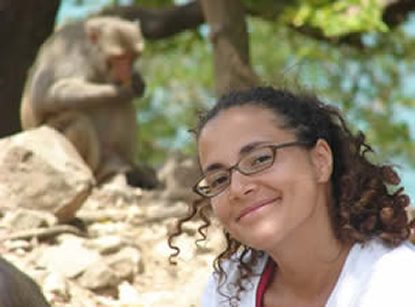 Jean-Paul commented, “A couple years ago I presented a research poster when MUPC was hosted at Macalester so I'm looking forward to presenting my honors thesis research and helping to host at Gustavus this year."
Jean-Paul commented, “A couple years ago I presented a research poster when MUPC was hosted at Macalester so I'm looking forward to presenting my honors thesis research and helping to host at Gustavus this year."
The MUPC keynote address will feature the 2012 John Kendall Lecture Series presenter, Dr. Laurie Santos. The address will take place at 11:00 a.m. in Alumni Hall in the Johnson Student Union. Dr.Santos is a professor at Yale University and is the director of Yale’s Comparative Cognition Laboratory. She also does research with primates at the Cayo Santiago field station off the coast of Puerto Rico and the Lemur Conservation Foundation Myakka City Reserve in Florida. Dr. Santos received her A.B. in Biology and Psychology from Harvard University (1997) and her Ph.D. in Psychology from Harvard (2003). She began teaching at Yale University in 2003. In 2012, Dr. Santos received the APA Distinguished Scientific Award for Early Career Contributions to Psychology in animal learning and behavior. Her talk entitled, “The Evolution of Irrationality: Insights from Monkeys” will highlight her research on the connections between human and primate cognition and the areas of knowledge that are unique to humans.
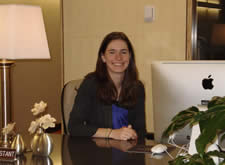 The Conference will be a great experience for all of those presenting and for those who want to learn more about student research currently being done in Psychology. So, be sure to come to the 2012 Minnesota Undergraduate Psychology Conference at Gustavus on Saturday, April 28th!
The Conference will be a great experience for all of those presenting and for those who want to learn more about student research currently being done in Psychology. So, be sure to come to the 2012 Minnesota Undergraduate Psychology Conference at Gustavus on Saturday, April 28th!
Registration Information and link: http://www.macalester.edu/mupc/
[Erica Hett is a junior Biology and Psychology major from Burnsville, MN. She is on the Cross Country team and Nordic Skiing team at Gustavus and is involved in BPLP and Elders. Erica is also a student assistant in the Psychology Department and a general psychology mentor.]
January 2012 Children's Hospital Boston Internship - Joe Watchutka
By Joe Watchutka
"This January I had the opportunity to intern at Children's Hospital Boston (CHB) under Gustavus Adolphus alumnus Dr. Yoshio Okada... Dr. Okada is a Visiting Professor of Neurology at Harvard Medical School and the MEG Program Director for the Fetal-Neonatal Neuro imaging & Developmental Science Center at CHG. Magnetoencephalography (MEG) is a neuro imaging technique which measures magnetic fields generated by neuronal activity in the brain. Dr. Okada created a MEG system specifically for use with infants and young children which is now being used at CHB for research purposes,
known as the BabyMEG.
I spent my time working for the BabyMEG lab manager and Instructor of Neurology at Harvard Medical School, Dr. Christos Papadelis. Dr. Papadelis and his team taught me a great deal about the operation of a MEG system, and of a research lab in general. I was able to assist in the daily operation of the BabyMEG and was fortunate enough to observe data collection from a few children. Aside from the BabyMEG system itself, I was able to help with the installation of various support and stimulus presentation systems used in the lab. This experience will be extremely valuable for my research projects at Gustavus Adolphus.
Systems such as the BabyMEG allow for research into brain development of healthy infants as well as that of infants with various neurological disorders. The research conducted at this lab may someday lead to better diagnostic techniques and treatment of neurological abnormalities in infants early in their development."
[Joe is a junior psychology honors major with minors in neuroscience and religion. He intends to move on to a graduate program in neuroscience after graduation.]
Semester Study Abroad - France - Molly Gillen
My name is Molly Gillen and I am a junior Psychology and French double major.This semester I am studying abroad in Montpellier, France. Montpellier is located in the south-eastern part of France, near the Mediterranean Sea.I chose to study in Montpellier because I wanted the chance to improve my language skills and learn about French culture in a small city full 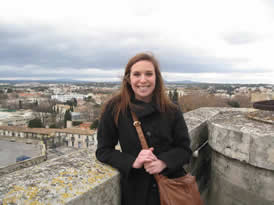 of college students.
of college students.
For housing, I chose to live with a host family. My host mother is 64 and a retired psychologist. As it is just the two of us, we have lots of time for discussion during meals and I have learned a lot from her, in both French and Psychology. This semester, I have five classes at the Université Paul-Valéry and one online class. The education system is completely different from the U.S. and all of my classes are in French, so it was hard to adjust at first.
For my two-week winter vacation, I traveled around Italy and visited my friend in Paris. In Italy I stayed in Florence, Cinque Terre and Rome; I even met up with two fellow Gusties along the way! In Paris, my friend’s family toured me around the whole city so that I could see all the sights. So far, studying abroad has been such a wonderful experience and I would definitely recommend it to anyone that has the chance! Happy Spring!
Psych Majors - MOVIE NIGHT - Don't miss it!
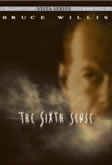
March 8th at 8:00 p.m - Psych Interaction Room - Beck 271
"The Sixth Sense"
Treats!
Faculty Research & Publications
Dr. Mark Kruger
Mark Kruger has had a paper accepted for publication in the March 2012 issue of the International
Trumpet Guild Journal (Volume 36, 3, pages 12-19). The article’s title is, “More Air, Less Air, What is Air?” and was written with his co-authors, Dr. Jonathan Kruger (Rochester Institute of Technology) and Dr. James McLean (SUNY-Geneso). The paper provides an empirical investigation of the use of air as energy to produce tones that differ in pitch and loudness by musicians playing the trumpet, horn, trombone, and tuba. [Contact Dr. Kruger (mgk@gustavus.edu) if you'd like to learn more.]

Dr. Marie Walker
A poster presentation has been accepted at the annual conference of Association for Psychological Science , Chicago, May 2012. Research was a PSY 344 Self and Identity class project Fall 2011."Relationship Schemas, Self-Esteem and Memories for Interactions with Others" - Angela Ahrendt, Chris Almen-Sjogren, Kaitlyn Andren, Katherine Arndt, Casey Corder, Kierst Finsand, Kesley Fredrick, Molly Gillen, Nicole Green, Michelle Isaacson,Jade Johnson, Courtney Kelzer, Laura Kientzle, Emily Klatt, Victoria Ott, Alisson Schultz, Caitlin Tice, Nick Yang
Alumni Update - Emma Iverson '10
[Emma Iverson, ’10 is currently living in Chicago, IL in a dual degree program, pursuing a Master’s in Child Development from the Erikson Institute and a Master’s of Social Work degree from Loyola University Chicago. She will graduate in December 2012 and hopes to find a job doing clinical work with young children with developmental disabilities.]
During the past two years (almost) since I graduated from Gustavus, I have spent a lot of time thinking and reflecting on my own education, budding professional career, and the lessons that I have been learning along the way.
Thus far, my journey has consisted of graduating from Gustavus, moving to Chicago, and beginning graduate school right away. Although this is definitely not the right path for everyone, I know that I made the right choice for myself, and it is a 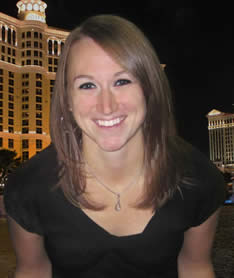 choice that many current Gustie psych majors may end up making as well. Like we all know, learning is a lifelong process and I am still very early in my professional development, but there are several things that I have found to be helpful along the way…
choice that many current Gustie psych majors may end up making as well. Like we all know, learning is a lifelong process and I am still very early in my professional development, but there are several things that I have found to be helpful along the way…
- Be active. In this case I don’t mean go to the gym--although that is a great way to deal with the inevitable stress that comes along with being a grad student, beginning professional, and human being in general! Although your classes and the academic knowledge that you obtain during your education and time at Gustavus are important, I have yet to have a professor, colleague, potential employer, or internship supervisor ask me about what I learned in my various psychology classes (or any others for that matter). They want to know what I’ve done. It has become rather common knowledge that experience is necessary (or at least very helpful) in getting a job, getting into grad school, entering the real world, etc. But this experience can come from many places. Volunteering, job shadowing, even informal conversation or informational interviews with people whose jobs sound interesting to you are all great ways to get experience. Looking for ways to explore different interests and to try interacting with different types of people also help you to become a more active learner. I have found that class material becomes much more interesting when I am able to connect it to something that I have experienced outside of the classroom as well. There are lots of opportunities available to students who take an active role in seeking them out. (Your professors and advisors can be a great place to start if you are looking for ideas!)
- Ask questions—and don’t be afraid of the answers. This one seems pretty obvious. But one of the most important things I have been learning as I begin my journey into the “real world” is that it is a VERY big place. There are so many people, places, topics, fields of study, etc. that it is impossible to know them all. And asking questions is often the best (if not the only) way to learn. In addition, asking questions means being open to the possibility that there might be answers that you had not considered before, things you might need to think about differently, or new ways of doing something different from what you have always done. This can be a difficult process. There have been many times over the past couple of years when I have been challenged in ways I couldn’t have imagined before. I have been pushed outside of my comfort zone and asked many difficult questions—and had them asked of me as well. But this has been an invaluable part of my learning, both inside and outside of the classroom. This process is one that began during my time at Gustavus (yes, I was one of those students who often had my hand up in class), but I have come to understand it more fully and realized its importance even more over the past couple of years.
- “It depends.”This is one of the catch-phrases that is used often in my child development classes. Although I have just gone on about the importance of asking questions, I can tell you that more often than not when a question is asked in my classes or in my professional experiences, the answer is (or at least begins with) “it depends…” So many areas of life are not black and white and there is no one right answer. I knew that this was true on some level in college, but I have been realizing that it is even more true in the so-called real world. There isn’t necessarily one right path or one right professional journey—but it depends on the choices that you make and the circumstances that you find yourself in. The way a child grows and develops depends on an innumerable number of factors (which usually just get simplified into “nature” and “nurture”) and this same concept can be applied to other kinds of growth and learning throughout the lifespan. Realizing this and embracing the need to consider multiple factors, influences, and perspectives can go a long way in reducing the pressure to come up with the one “right answer” and also allows for a lot of important learning to take place!
Click here for previous Alumni Updates
Click here for Professional Opportunities
Upcoming Events:
Senior Psychology Area Field Exam - Appointments have been scheduled Tuesday 3/6, Wednesday, 3/7 and Thursday 3/8 at 7PM in Beck 203. This exam is administered annually to senior psychology majors and assists the department in assessing student learning and in evaluating the curriculum. Test scores will provide students with a measure of their learning and are utilized by the department to identify strengths and weakness of the current curriuclum in camparison to national norms.
Psi Chi Induction - Tuesday, April 17
MUPC - Gustavus Adolphus College - Beck Academic Hall -- Saturday, April 28
National Conference on Undergraduate Research -- Weber State University, Utah - March 29-31, 2012
Celebration of Creative Inquiry - Friday, May 4, 2012
Honors Day - Saturday, May 5, 2012
Why is this newsletter named Emil's Epilogue and who is Carl Emil Seashore?
 In the entry lobby of the psychology
department there is a bust of Carl Emil Seashore, an 1891 graduate of
Gustavus. Widely recognized as one of the early leaders in psychology in
America, Dr. Seashore spent most of his professional life at the
University of Iowa. He was a member of the faculty at Iowa from 1897
until his retirement in 1937. In addition to his duties as professor and
chairman of his department, he was made Dean of the Graduate School,
University of Iowa, in 1908 and held that position concurrently with his
other duties for 28 years. He retired in 1937 at the age of seventy but
was recalled as Dean Pro Tempore of the Graduate School in 1942 and
finally retired for the second time in 1946 at the age of 80. Most
people who recognize his name today associate it with the Seashore Tests
of Musical Ability which are still widely used. He was a man of wide
ranging abilities and achievements and certainly one of the outstanding
alumni of Gustavus. Click here for additional biographical information on Carl Emil Seashore..
In the entry lobby of the psychology
department there is a bust of Carl Emil Seashore, an 1891 graduate of
Gustavus. Widely recognized as one of the early leaders in psychology in
America, Dr. Seashore spent most of his professional life at the
University of Iowa. He was a member of the faculty at Iowa from 1897
until his retirement in 1937. In addition to his duties as professor and
chairman of his department, he was made Dean of the Graduate School,
University of Iowa, in 1908 and held that position concurrently with his
other duties for 28 years. He retired in 1937 at the age of seventy but
was recalled as Dean Pro Tempore of the Graduate School in 1942 and
finally retired for the second time in 1946 at the age of 80. Most
people who recognize his name today associate it with the Seashore Tests
of Musical Ability which are still widely used. He was a man of wide
ranging abilities and achievements and certainly one of the outstanding
alumni of Gustavus. Click here for additional biographical information on Carl Emil Seashore..